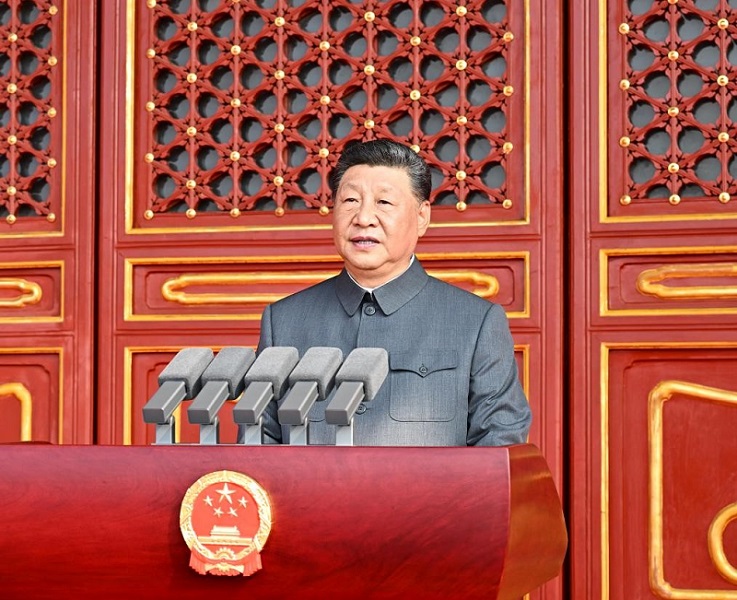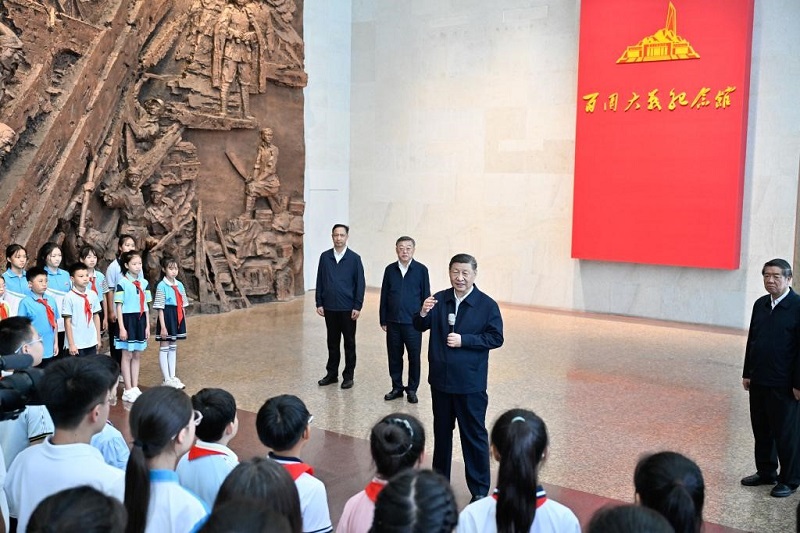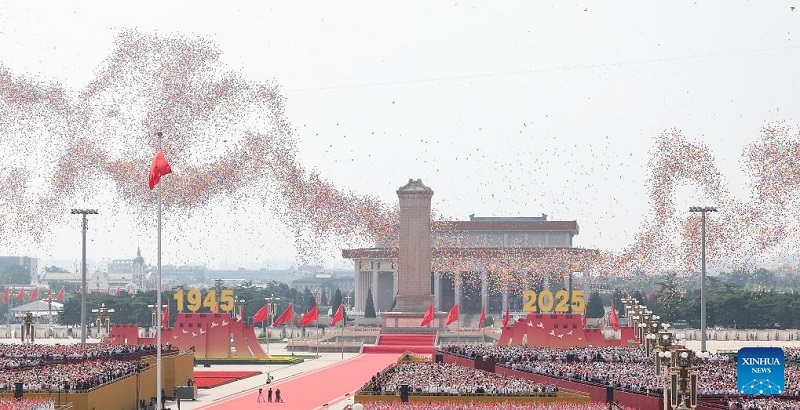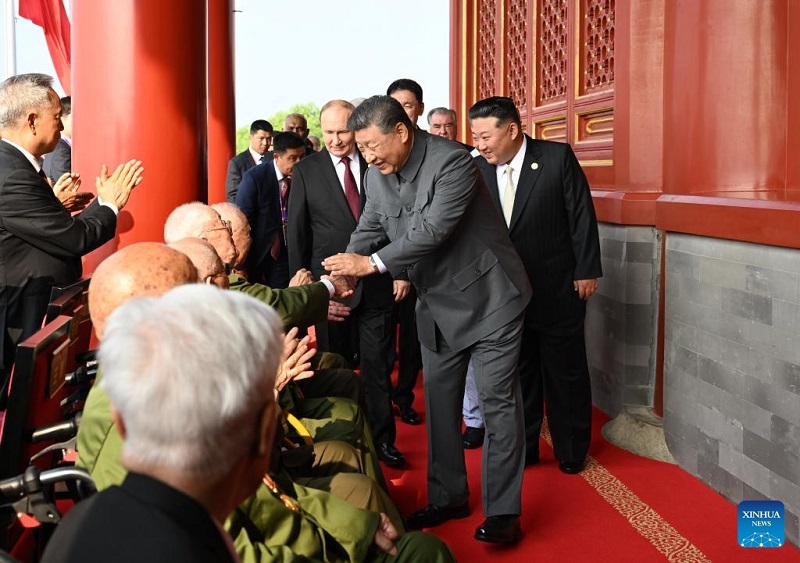Chinese President Xi Jinping’s V-Day addresses call for honoring history to preserve peace, as the country commemorates the 80th anniversary of its hard-won victory in WWII.
On the morning of September 3, 2025, three helicopters flew over Tian’anmen Square with banners that read “Justice prevails,” “Peace prevails,” and “The people prevail.” This was China’s message to the world as it held a grand military parade to commemorate the 80th anniversary of the victory in the Chinese People’s War of Resistance against Japanese Aggression and the World Anti-Fascist War.
Eighty years later, despite this hard-won victory, peace still remains elusive for many people around the world. In a speech before the parade, President Xi Jinping explained that the purpose of the event was to remember history, honor fallen heroes, cherish peace, and create a better future.

Chinese President Xi Jinping, also general secretary of the Communist Party of China Central Committee and chairman of the Central Military Commission, delivers an important speech during a grand gathering to commemorate the 80th anniversary of the victory in the Chinese People’s War of Resistance against Japanese Aggression and the World Anti-Fascist War in Beijing, capital of China, Sept. 3, 2025. (Xinhua/Yan Yan)
Pageantry for Remembering the Past
Commemorating victory requires a clear and truthful understanding of history. In a signed commentary titled “Learning from History to Build Together a Brighter Future,” published before his state visit to Russia and attendance of celebrations marking the 80th anniversary of the Victory in the Soviet Union’s Great Patriotic War in May 2025, Xi wrote, “We must uphold a correct historical perspective on WWII.”
On the one hand, this perspective seeks to highlight the evil nature of the fascist forces that waged the brutal war and the tremendous trauma and damage they inflicted on innocent people. On the other hand, it means acknowledging the huge sacrifice that the Chinese people have made and their pivotal contributions to the victory in the World Anti-Fascist War.
China paid a staggering price in this war. During that arduous 14 years from 1931 to 1945, more than 35 million Chinese soldiers and civilians were killed or wounded, making China the country with the heaviest losses among all the Allied nations in the World Anti-Fascist War. The country also endured direct economic losses of around US $100 billion, with indirect losses exceeding US $500 billion.
As Xi emphasized in his parade speech, through immense sacrifice in the War of Resistance Against Japanese Aggression, an integral part of the World Anti-Fascist War, the Chinese people made a vital contribution to the salvation of human civilization and the safeguarding of world peace.
As a recent article published by the Associated Press reported, “China was a major battle front in World War II, a fact often overlooked in accounts that focus more on the fight in Europe and U.S. naval battles in the Pacific.”
Rana Mitter, a historian and professor at the Harvard Kennedy School, shared this view and indicated that more work needs to be done on exposing China’s wartime contribution.
Believing that the Chinese People’s War of Resistance against Japanese Aggression is an important part of the World Anti-Fascist War, Ritter told Xinhua that despite technological disadvantages and harsh conditions, China’s persistent resistance helped to tie down Japanese forces and to force millions of Japanese troops to be occupied on the mainland, rather than being redeployed elsewhere in the Asia-Pacific region.

Chinese President Xi Jinping, also general secretary of the Communist Party of China Central Committee and chairman of the Central Military Commission, talks with students and staff members at the memorial hall commemorating the Hundred-Regiment Campaign during the war of resistance against Japanese aggression, when inspecting Yangquan City, north China’s Shanxi Province, July 7, 2025. (Xinhua/Yin Bogu)
While China played a pivotal role in the war, the Communist Party of China (CPC) served as a key pillar of resistance. On July 7, 2025, Xi Jinping visited a memorial hall in north China’s Shanxi Province dedicated to the Hundred-Regiment Campaign, a major operation launched by the CPC during the Chinese People’s War of Resistance Against Japanese Aggression. Fought between August 1940 and January 1941 in northern China, the Campaign not only struck a heavy blow against the enemy but also significantly strengthened the Chinese people’s resolve and confidence, at a time when calls for surrender were growing.
At the site, Xi said, “Coming here today carries special significance as the day coincided with the 88th anniversary of the July 7th Incident, which marked the beginning of China’s whole-nation resistance against Japanese aggression.” He stressed that the CPC was the pillar of the national resistance, adding that the Campaign demonstrated to the world the determination and strength of the CPC and the Chinese people in the resistance against Japanese aggression.
Official statistics show that during the War Against Japanese Aggression, the Eighth Route Army, the New Fourth Army, and the Southern China People’s Counter-Japanese Guerrilla Force led by the CPC fought in more than 125,000 battles, eliminating over 1.714 million Japanese and puppet armies, which accounted for 60 percent of the invading Japanese forces and 95 percent of the puppet army, playing a decisive role in sustaining the resistance and securing final victory.
In his victory parade speech, Xi reiterated the CPC’s pillar role. He said that under a national united front against Japanese aggression advocated by the CPC, the Chinese people fought against a formidable enemy with an unyielding spirit and built a Great Wall of defense with their flesh and blood, achieving China’s first complete victory against foreign aggression in modern times.

Balloons and pigeons are released into the sky over Tian’anmen Square in Beijing, capital of China, Sept. 3, 2025. China on Wednesday held a grand gathering to commemorate the 80th anniversary of the victory in the Chinese People’s War of Resistance against Japanese Aggression and the World Anti-Fascist War. (Xinhua/Yao Dawei)
History Mirrors the Future
Eight decades have passed since China and the Allied nations emerged victorious from one of the darkest chapters in human history. Yet the shadows of conflict and war still haunt the world. “Humanity is again faced with a choice of peace or war, dialogue or confrontation, and win-win outcomes or zero-sum games,” Xi cautioned in his victory parade speech.
Reflecting on the lessons of World War II is, therefore, essential to guide us toward making the correct choices.
One major lesson from history is the importance of cooperation and mutual support. World War II stands as a powerful example, when countries and political forces set aside their differences to unite against the common threat of fascism. In China, the CPC and the Nationalist government led by the Kuomintang (KMT) temporarily overcame their divisions to jointly resist Japanese aggression.
Internationally, the American Flying Tigers fought shoulder to shoulder with the Chinese people against Japanese forces, with over 2,000 of them being sacrificed. Many Chinese people also lost their lives while rescuing downed American pilots. Replying to a letter from Flying Tigers veterans in 2023, Xi said the people of China and the United States stood together in the fight against Japanese fascism, endured the test of blood and fire, and forged a profound friendship.
From German businessman John Rabe, who sheltered more than 20,000 Chinese civilians during the Nanjing Massacre, to Canadian surgeon Norman Bethune, who not only treated the wounded but also trained Chinese medical workers, these stories testify to the power of cooperation in times of great difficulty.
Acknowledging that the Chinese people won the great victory through their united efforts with the anti-fascist Allied forces and the people around the world, Xi expressed China’s gratitude to them at a reception commemorating the 80th anniversary of the victory of the Chinese People’s War of Resistance Against Japanese Aggression and the World Anti-Fascist War following the military parade. “The Chinese government and people will never forget the foreign governments and international friends who supported and assisted the Chinese people in resisting aggression,” said Xi.
He summarized this lesson in the victory parade speech. Saying that history warns us that humanity shares a common destiny, he emphasized that only when nations across the world treat each other as equals, live in harmony, and mutually support each other can we safeguard common security, eliminate the root cause of war, and prevent the historical tragedies from recurring.

Chinese President Xi Jinping, also general secretary of the Communist Party of China Central Committee and chairman of the Central Military Commission, shakes hands with war veterans at Tian’anmen Rostrum in Beijing, capital of China, Sept. 3, 2025. China on Wednesday held a grand gathering to commemorate the 80th anniversary of the victory in the Chinese People’s War of Resistance against Japanese Aggression and the World Anti-Fascist War. (Xinhua/Xie Huanchi)
Another vital lesson is the need to cherish and safeguard peace. The state-of-the-art weaponry and impressive troop drills at Tian’anmen Square demonstrated China’s military might, yet their purpose was not to show aggression against other nations, but as a form of deterrence and self-defense. Having endured numerous wars since the Opium War of 1840, the Chinese people have learned through bitter experience the true value of peace. Thus, as China’s strength grows, it remains steadfast in its commitment to upholding peace.
“The Chinese people will stand firmly on the right side of history and on the side of human progress, adhere to the path of peaceful development, and join hands with the rest of the world to build a community with a shared future for humanity,” said Xi in his victory parade speech.
Calling for humans to pull together in solidarity and harmony and ensure the darkness of history does not repeat itself, Xi affirmed that, “At all times, we must always commit to the path of peaceful development, stay resolved to safeguard global peace and tranquility, and work together to build a community with a shared future for humanity.”
As Xi and other world leaders shook hands with six military veterans, now in their nineties, on the Tian’anmen Rostrum, the veterans’ faces shone with joy and pride. Overhead, it was no longer enemy warplanes that darkened the skies, but the precise formations of a Chinese military that embodies the conviction of: “Justice prevails, peace prevails, and the people prevail.”